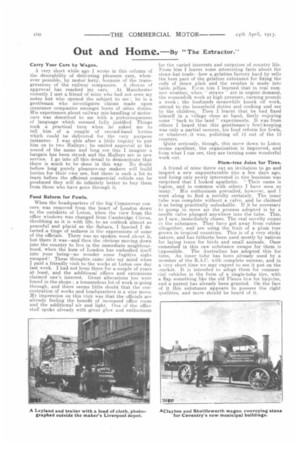Out and Home.—By " The Extractor."
Page 14

If you've noticed an error in this article please click here to report it so we can fix it.
Carry Your Cars by Wagon.
A very short while ago I wrote in this column of the desirability of delivering pleasure cars, whenever possible, by motor lorry, because of the transgressions of the railway companies. A chorus cf approval has reached my ears. At Manchester recently I met a friend of mine who had not seen my notes but who opened the subject to me ; he is a gentleman who investigates claims made upon insurance companies amongst hosts of other duties. His experiences about railway mis-handling of motorcars was described to me with a picturesqueness of language which seemed fully justified. Things took a practical turn when he asked me to tell him of a couple of second-hand lorries which could be delivered for the very purpose instanter. I was able after a little inquiry to put him on to two Halleys ; he smiled approval at the sound of the name and long ere this I imagine a bargain has been struck and the Halleys are in new service. I go into an this detail to demonstrate that there is much to be done in this way. No doubt before long purely pleasure-car makers will build lorries for their ownuse, but there is such a lot to learn before the efficient commercial vehicle can be produced they will do infinitely better to buy them from those who have gone through it.
Food Reform for Fowls.
When the headquarters of the big Commercar concern was removed from the heart of London down to the outskirts of Luton, when the view from the office windows was changed from Cambridge Circus, throbbing as it is with life, to an outlook almost as peaceful and placid as the Sahara, I fancied I detected a tinge of sadness in the expressions of some of the officials. There was no spoken word about it, but there it was—and then the obvious moving down into the country to live in the immediate neighbourhood, when the hum of London has embodied itself into your being—no wonder some fugitive sighs escaped! These thoughts came into my mind when I paid a friendly visit to the works at Luton one day last week. I had not been there for a couple of years at least, and the additional offices and extensions claimed one's interest. Great alterations too were found in the shops ; a tremendous lot of work is going through, and there seems little doubt that the concentration of works and headquarters is a wise move. My impression on this visit was that the officials are already feeling the benefit of increased office room and the additional air and light. One of the office staff spoke already with great glow and enthusiasm
for the varied interests and surprises of country life. From him. I learnt some interesting facts about the straw-hat trade—how a gelatine factory hard by sells the best part of the gelatine substance for fixing the coils of straw plait and the residue is made into table jellies. Frem him I learned that in real summer weather, when " straws are in urgent demand, the womenfolk work at high pressure, earning pounds a week ; the husbands meanwhile knock off work, attend to the household duties and cooking and see to the children. Then I learnt that he had fixed himself in a village close at hand, finely enjoying some " back to the land '' experiments. It was from others I heard that this gentleman's fowl-keeping was only a partial success, his food reform for fowls, or whatever, it was, polishing off 12 out of the 13 roosters.
Quite seriously, though, this move down to Luton seems excellent, the organization is improved, and from what I can see, they are turning some wonderful work out.
Plum-tree Juice for Tires.
A friend of mine threw out an invitation to go and inspect a new unpuneturable tire a few days ago, and being only newly interested in tire business was surprised that I looked apathetic. " Their name is legion, and in common with others I have seen so many." His enthusiasm prevailed, however, and I went along to find a novelty certainly_ The inner tube was complete without a valve, and he claimed it as being practically unloakable. If it be necessary to pump in more air the process adopted is by a needle valve plunged anywhere into the tube. This, as I saw, immediately closes. The real novelty comes in the substance. They have got away from rubber altogether, and are using the fruit of a plum tree grown in tropical countries. This is of a very sticky nature, and has hitherto been used mostly by natives for laying trans for birds and small animals. Once enmeshea in this raw substance escape for them is
inpossible. The Australian has adopted this for tires. An inner tube has been already used by a member of the R.A.C. with complete success, and in a very short time we may expect to see it put on the market. It is intended to adopt them for commercial vehicles in the form of a single-tube tire, with a flap something like the old Fleuss tire for bicycles, and a patent has already been granted. On the face of it this substance appears to possess the right qualities, and more should be heard of it.
























